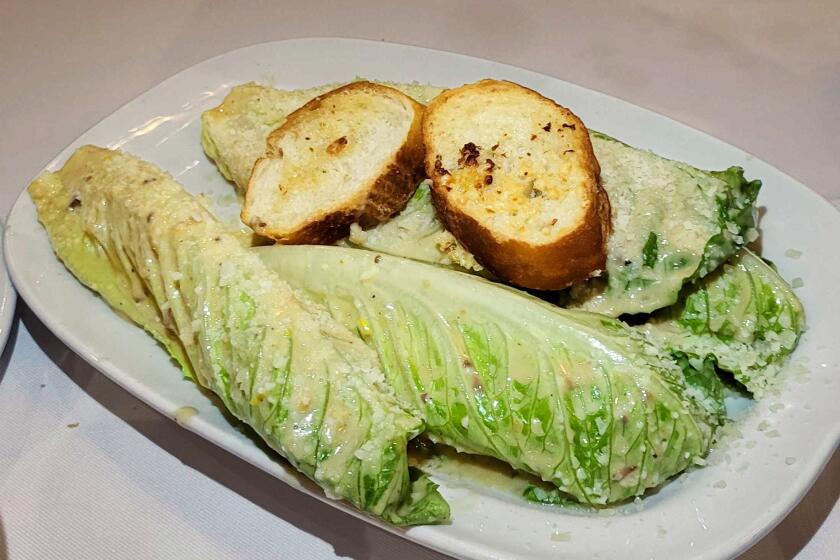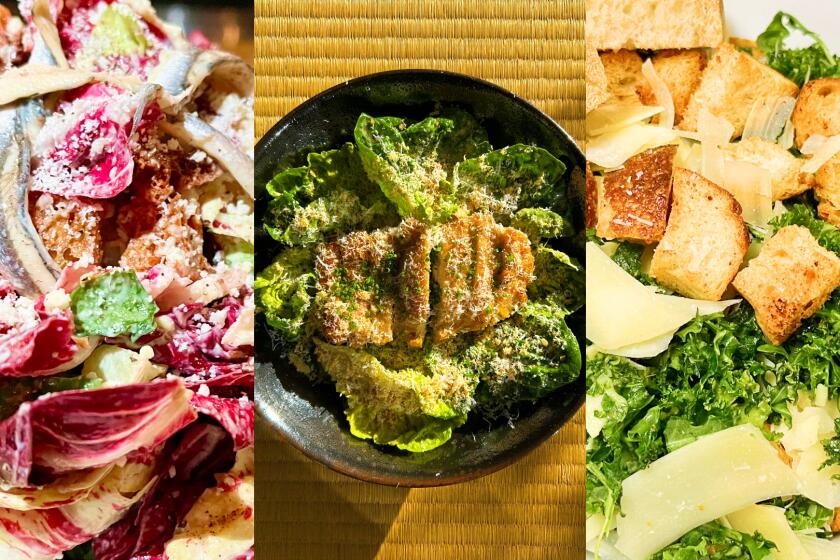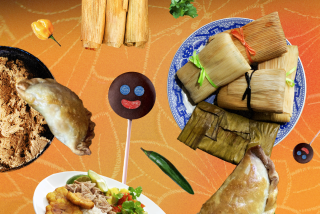
- Share via
When I was 24, standing in the kitchen of the house where I grew up in San Diego, I got the only Christmas present my dad would ever give me. It reflected his very essence, and I carry it with me to this day: He taught me how to make an authentic Caesar salad.
The Caesar salad celebrated its 100th birthday this summer, and you couldn’t open a food publication without reading about its origin story or how it’s the most popular salad in the world or how it continues to be riffed on, dressed up, dumbed down and served by that name and others at just about every restaurant in the U.S. But for me, the Caesar is more than a salad — it’s a member of my family. It’s my dad in a wooden bowl.
My dad’s gift came about like this: A few months before, with my hands on my hips in that same kitchen, I’d asked my mom: “Why haven’t I ever gotten to see my dad on Christmas?” My dad, who was Mexican, lived across the border, in Tijuana, where both the Caesar salad and I were born. He’d landed there in the 1950s after leaving his job as a waiter at the famed Casa Blanca Hotel in Acapulco and ended up tossing salads tableside in a tuxedo at the restaurant in the Hotel Caesar, where the salad was invented.
This Caesar salad recipe is a family heirloom, passed down from father (who worked at the Hotel Caesar in Tijuana, where the salad was born) to daughter.
But my dad was no ordinary ensaladero. By the time he opened his own restaurant, El Bodegón de Guillermo, a few blocks from Hotel Caesar, in the early 1960s, he was not only a judge of local bullfights but also, as Lana Turner purportedly introduced him in the ring, “The most popular man in Tijuana. Famous for being famous.”
My dad’s restaurant was a mecca for movie stars and politicians, bullfighters and beautiful women. Guillermo tossing a Caesar salad tableside in a flurry of lettuce leaves and charisma was front and center. My mom was one of the beautiful women.

My parents divorced when I was 3, and my mom brought me and my older sister across the border to San Diego in a sparkling gold 1968 Plymouth Barracuda that our dad had bought her with the winnings of a good night of dominoes. She supported us as a court reporter; after she met and married our stepdad, a Superior Court judge, we proceeded to grow up in a conservative upscale suburb eating Caesar salad tossed with Kraft Golden Caesar dressing and shelf-stable “Parmesan cheese” shaken from a green cardboard canister.

A server wheels a cart toward the diner at the Hotel Caesar restaurant in downtown Tijuana to begin the ritual of a tableside Caesar salad, invented here, according to lore.
Meanwhile, my dad proceeded to have another family — his third — in Tijuana, and I can count the times I remembered seeing him on my hands. He came to two birthday parties, one early on, when he walked in carrying a piñata full of candy like a fairy tale prince. And when I was in sixth grade, he came with a handful of very tiny, extremely hot chile peppers in his coat pocket that he nibbled on throughout the afternoon, and I showed him off to my gringa friends: “my real Mexican dad.” Mostly, we saw him when our mom plunked us down in a booth in his restaurant and he’d intermittently sit with us and rove the room tossing Caesar salads.
“Don’t blame me.” My mom laughed at the idea that I might be holding her responsible for my dad’s whereabouts at Christmas or any other time. “You want to see your dad on Christmas, invite him over.”
Twenty years ago, when I first returned to my native California from New York City, I tapped out a letter to the Food editor of this newspaper instructing her in no uncertain terms what exactly was what when it came to a classic Caesar salad.
The year before my salad schooling, I’d canceled my wedding the night before Christmas Eve, three weeks before it was to take place. While planning the wedding, the caterer had told me that the reception would be “a bride-to-be’s first chance to show off how she wants to entertain.” This bride-to-be had never given any thought to how she wanted to entertain. Our holidays had been small — just me, my sister, my mom and Hugo.
Newly single, just out of college and trying to find my way, I got a job with the wedding caterer and spent the year passing trays of endive spears cradling tiny mounds of caviar and toast points adorned with sliced rare tenderloin and balsamic-onion jam for engagements and nuptials, anniversaries and birthdays, retirements and baby namings.

I envied these big, multigenerational families and their loud, layered get-togethers and came to realize that what I had been most excited about during my short engagement was not our happily-ever-after — I never could imagine that. What I really wanted from my wedding, and how I realized I wanted to entertain, was to have my whole, fragmented family feasting together.
My mom’s comment was like a dare, and I took it. My dad had six kids in all, two by each of three wives. (I am child “2.2”; second wife, second child.) I invited them all and, with the caterer’s help, prepared a meal designed for my dad: grilled whole beef filets, served with red wine sauce; butternut squash puree; creamed spinach; a booze-spiked apple crumble; and, the main event, the components to make a Caesar salad, which I asked my dad to make for us all at the long table I’d rented for the occasion.
Los Angeles restaurants are putting a fresh spin on the classic Caesar salad, from tableside preparations to an experimental take that substitutes rice crackers for croutons.
As my brothers (from his first and third marriages) grilled the tenderloins on the terrace, my dad gave me a master class in Caesar salad. Making the authentic version, he explained, was a matter of using the correct key ingredients — for the dressing, a whole egg (coddled, which means it sits in a bowl of warm water until you’re ready to use it); garlic (originally used to season the croutons that are an integral part of a Caesar salad, but as the salad has evolved, it has become part of the dressing); grated Parmesan (loads); Mexican limes (not lemons); anchovies; Dijon mustard; coarsely ground black pepper; and a few dashes of Tabasco (my dad’s dos centavos added to the recipe).
A proper Caesar dressing is emulsified, meaning the egg and oil molecules are suspended during the whisking process, so essentially, it’s a doctored-up mayonnaise, thick enough to truly coat each leaf of lettuce. One of the most important steps in preparing a Caesar salad is removing the outer dark green leaves of lettuce and chopping off the floppy dark green tops of what’s left. So the salad is built with only the crunchiest, sweet acid-green hearts that can stand up to that thick dressing without wilting into a soggy heap.
Whisk and chop and toast and toss we did.


Heirloom lettuces can stand in for the romaine in Caesar salad. (Catherine Dzilenski / For The Times)

Buttery croutons, punchy with garlic, are baked until golden. (Catherine Dzilenski / For The Times)
And here it was. Dinner time. Seventeen people, all but a handful with the last name Carreño, sitting around a long table in my mother’s house in front of her pot-bellied stove, all there in good faith and love, passing the butter and the side dishes, refilling one another’s wine glasses, being a modern family. Bottles emptied and ashtrays filled up, and the white rented tablecloth was a beautiful stained map of the evening.
I had created what I’d longed for: a loud, layered multigenerational gathering. After the long dinner, wives and sisters-in-law gathered in the kitchen, helping clean up and doing their best to connect in different languages, while the rest of the party moved into the sunken living room. Grandkids the same ages as the youngest siblings break-danced in front of the Christmas tree; and my stepdad and my real dad chatted in front of the fire.
My mom came and put her arm around my shoulder. I don’t remember if she said she was proud of me or if I just knew it.
I had everything I ever wanted: my family. Caesar’s greetings to all, and to all, a good night.
Get the recipe
The Caesar Salad That Came to Christmas
Carolynn Carreño is a Los Angeles food writer and cookbook author.
More to Read
Eat your way across L.A.
Get our weekly Tasting Notes newsletter for reviews, news and more.
You may occasionally receive promotional content from the Los Angeles Times.














